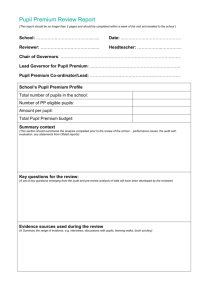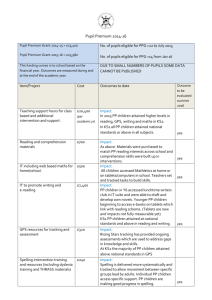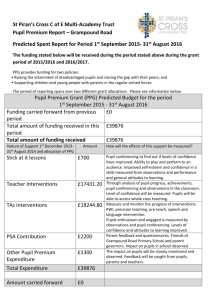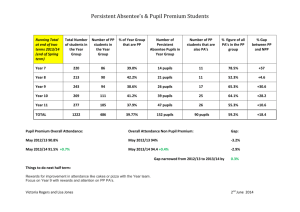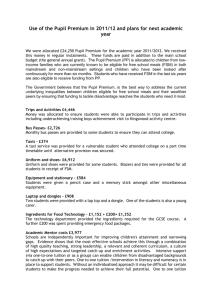Funding & Impact - Pupil Premium Inc. Catch Up 2014/2015
advertisement
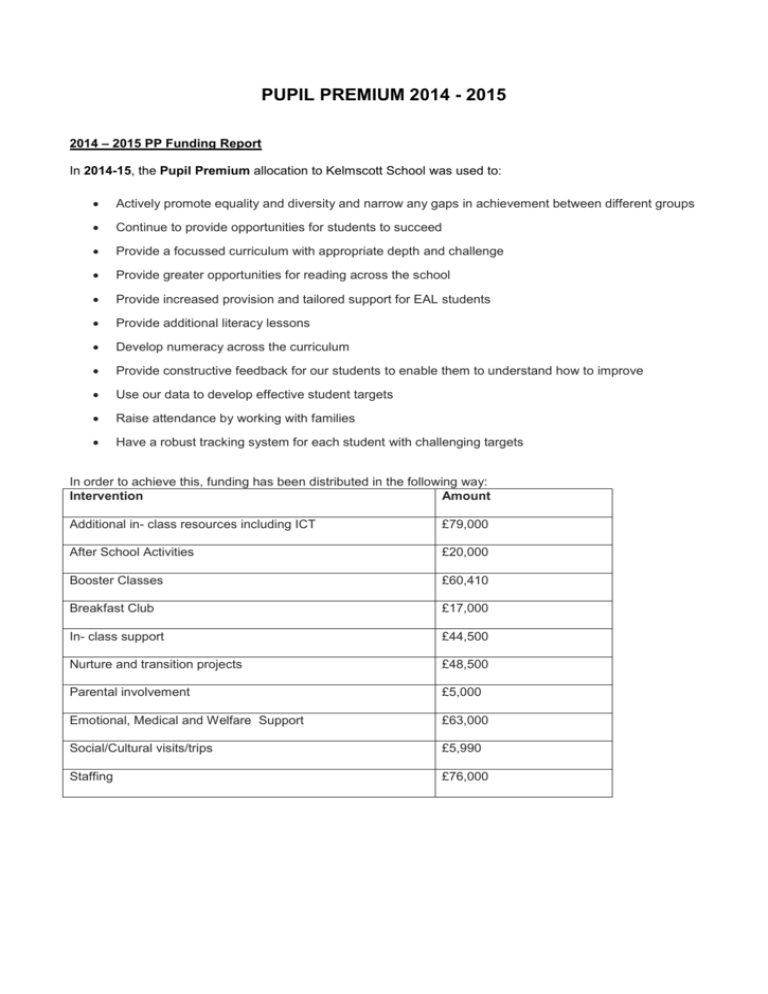
PUPIL PREMIUM 2014 - 2015 2014 – 2015 PP Funding Report In 2014-15, the Pupil Premium allocation to Kelmscott School was used to: Actively promote equality and diversity and narrow any gaps in achievement between different groups Continue to provide opportunities for students to succeed Provide a focussed curriculum with appropriate depth and challenge Provide greater opportunities for reading across the school Provide increased provision and tailored support for EAL students Provide additional literacy lessons Develop numeracy across the curriculum Provide constructive feedback for our students to enable them to understand how to improve Use our data to develop effective student targets Raise attendance by working with families Have a robust tracking system for each student with challenging targets In order to achieve this, funding has been distributed in the following way: Intervention Amount Additional in- class resources including ICT £79,000 After School Activities £20,000 Booster Classes £60,410 Breakfast Club £17,000 In- class support £44,500 Nurture and transition projects £48,500 Parental involvement £5,000 Emotional, Medical and Welfare Support £63,000 Social/Cultural visits/trips £5,990 Staffing £76,000 2014 – 2015 PP Impact Report NB. National figures quoted are 2014 Achievement PP Allocation for 2014 – 2015: £308,410 Interventions focused on learning in the classroom include the introduction of numeracy coordinator, additional staffing in English and Maths, provision of additional classroom assistants providing in-class, small group and one-to-one support, intensive targeted and one-to-one tuition after school and a continuing focus on raising literacy levels through a whole school accelerated reading programme. These interventions have impacted significantly on progress across the curriculum at Key Stage 3 and the success is evidenced in our end of Key Stage 3 analysis which shows that in 11 of the 18 subjects, including English, Maths and Science; an equal or higher percentage of pupil premium students achieved 2+ levels of progress than non-pupil premium students. In addition to the above, Booster and Revision classes have been held in each of the school holidays and were accessed by all 86 of the Year 11 pupil premium students. The impact of these funded interventions for GSCE students can be seen by a steady narrowing of the gap between pupil premium and non-pupil premium students in the majority of subjects; with the gap in many subjects becoming non- existent. At Kelmscott, 46% of pupil premium students achieved 5+ with English and Maths compared to 36% nationally. The gap for at 5 A-C with English and Maths for Kelmscott students is 22% compared to 27.5% (national). In English, pupil premium students do as well as non- pupil premium students in making expected progress (which is significantly above the national figure) and in Maths the figure matches the national figure. Other significant evidence of the impact of the funding can be seen by: The percentage of FSM students achieving the English Baccalaureate where students at Kelmscott are in the highest 20% of similar schools. Comparing with national value added results for free school meals students; English, Science and Modern Languages are significantly better. The percentage of Kelmscott free school meals students achieving 3 levels of progress from KS2 to KS4 in English (80.3%) is in the highest 20% of similar and Waltham Forest schools. Engagement PP Allocation for 2014 - 2015: £110,995 The employment of a school nurse, a family liaison officer and family support programmes have been continued this year to address barriers to learning related to the family. Engaging with siblings in our feeder schools and parents aims to raise aspirations and promote engagement for supported students. The success of this intervention has so far been an improvement in attendance, behaviour and participation in school life leading to higher attainment. Pupil premium students regularly accessing the services of our school nurse have increased this year to 28. The services provided by the nurse include medical, emotional and social support and guidance together with referrals to outside agencies for both medical and health and lifestyle issues. The services of a trained Counsellor continue to be engaged to address disadvantaged students’ barriers to learning by being given the space and time to speak about what they need. Talking with an independent person can sometimes help students to use their intellectual and emotional resources and can enable them to develop some resilience to adapt to changes in their lives in order to ‘ narrow the gap’ between themselves and their peers.. Counselling takes place during the school day and sessions last for 50 minutes on a weekly basis. Participation in school and attendance for these students has improved. Co - curricular enrichment activities are offered as part of pre and after school and weekend clubs. Although not exclusively run for disadvantaged students, those students are targeted to participate. All 449 students engaged in at least one club during the course of the year and two thirds of these students continued to attend for the whole year. These clubs ranging from fashion design to Judo; they seek to promote personal and social skills that will help disadvantaged students engage with school life, learn new skills or cement current skills. It also supports their learning and is an opportunity to expand their friendship circles. Our activity programme has benefitted students by improving self-confidence and aspirations and the success of these sport and aesthetic activities have impacted on academic attainment across the curriculum with many departments seeing an increase in A* to C grades. Research proves bullying and behaviour issues are lower than normal when clubs/activities are well attended. Attendance Since the introduction of the pupil premium funding, Kelmscott has funded a range of strategies aimed at improving attendance. In addition to monitoring strategies and incentives to promote good attendance and punctuality, the school now opens from 7.30 for students. In preparation for the learning day, our Library offers a quiet reflective study environment and our Breakfast Club offers a healthy breakfast and the opportunity to start the day in an informal yet focussed environment that prepares students for the day ahead. Research has shown that breakfast is the most important meal of the day which can benefit learning and engagement in the classroom and in 2014/2015, 53 pupil premium students attended for the full year. The impact of the various initiatives to promote strong attendance is evidenced by 83% of targeted pupil – premium students improving their attendance to above 95% in 2014/2015. Residential/Social and Cultural Visits Kelmscott has funded numerous of international, residential and cultural visits for identified students including aspirational trips for pupil premium HAPs students. 2014 & 2015 Catch- up Premium Funding and Impact 2014 Funding: £25,500 2015 Funding: £16,000 The allocation of £500 per eligible pupil joining us in year 7 which has been allocated to interventions and projects aimed at raising achievement and developing confidence. In order to facilitate a successful transition for children, Kelmscott has invested in several projects including: Nurture Group CATs Testing Summer Activities programme Most importantly, our Nurture Group (Super Skills) provides targeted lessons to support the raising of literacy and numeracy in pupils arriving with low reading ages and/or below Level 4. By creating an additional group supplemental to the standard year 7 curriculum, pupils are provided with the opportunity develop literacy and numeracy skills in a small group environment and to engage when they might otherwise be at the back of the class not learning and enjoying. With leading practioner focus and targeted work to ensure their levels are improved as well as reading ages, the teaching aims to raise achievement and ‘graduate’ pupils back in to normal lessons return. Information from pupils through Pupil Voice indicates that the intervention is successful. Pupils refer to feeling more confident and independent in their learning. Superskills allows pupils to make a rapid progress towards their age-based progress measure. Evidence of this can be seen in the fact that last year 77% of pupils in Superskills made better than expected progress in English and 85% made better than expected in Maths. Catch- up funding has also provided an Easter Superskills workshop accessed by 5 pupil premium students and a Year 6 transition camp for 25 pupils.

